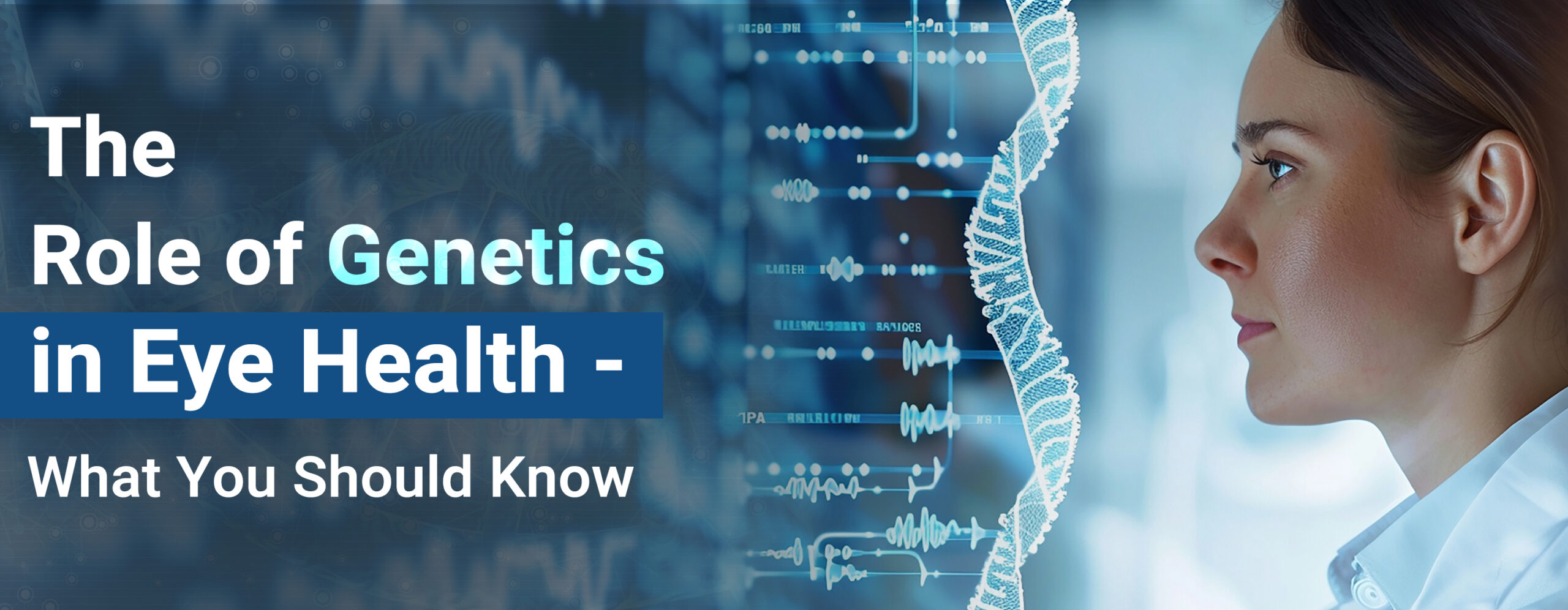
-
 Posted By shubham dhyani
Posted By shubham dhyani -
-
Comments 0
Your eyes are windows to the world. But did you know they’re also windows to your genetic map? Finding out how genetics and eye health go hand-in-hand can be the key to safeguarding your sight for decades to come. The connection between the genetics of vision and a number of eye disorders is far more complicated than most understand. Your genes control almost everything – from the way your retina forms to your vulnerability to certain eye illnesses.
Learning How Genetics Shape Your Vision
Genetics are responsible for both your eye features and disease susceptibility. Your genes are biological blueprints that regulate eye development, determining:
- The structure of the retina and lens
- Development of visual acuity
- Susceptibility to eye disease
- Your response to treatments
Hereditary eye conditions may occur at various stages of life, ranging from childhood conditions such as cataracts to age-related issues like macular degeneration. Refractive disorders that are common in families, including myopia, hyperopia, and astigmatism, also have strong genetic factors.
Genetic predisposition doesn’t mean you’ll necessarily get a condition – it just means you need to be more proactive regarding prevention and early diagnosis.
Common Genetic Eye Conditions
Some eye diseases have confirmed genetic associations that greatly affect their development:
High-Risk Genetic Eye Conditions:
- Glaucoma – Elevated eye pressure destroying the optic nerve; family history greatly increases risk
- Age-related Macular Degeneration (AMD) – Impacts central vision; high family history correlation
- Retinitis Pigmentosa – Gradual degeneration of the retina, inducing night blindness and peripheral vision loss
Moderate-Risk Conditions:
- Cataracts – Age-related, but genetic predisposition can lead to earlier occurrence
- Stargardt Disease – Hereditary macular degeneration that starts in childhood, commonly due to mutations in ABCA4 gene
- Colour Blindness – X-linked pattern of inheritance, more prevalent in males.
Condition | Genetic Link | Key Features |
Glaucoma | Strong | Optic nerve damage, increased pressure |
AMD | Strong | Central vision loss, family history of risk |
Retinitis Pigmentosa | Strong | Night blindness, peripheral vision loss |
Cataracts | Moderate-Strong | Lens clouding, early onset possible |
Color Blindness | Strong | X-linked, male predominance |
These genetic factors affecting eyesight demonstrate why understanding your family history is crucial for proactive eye care.
Also Read:- Why Regular Eye Checkups Are Essential After 40: What to Expect and Watch For
Advantages of Genetic Testing and Family History
What Does Genetic Testing Tell You: Genetic testing can reveal the mutations in your DNA that are associated with eye disorders. With its help, you can find out the risk levels of developing certain conditions. Along with that, the testing can also predict how your body will react and adapt to the treatment and medications.
Why Family History Matters:
- Immediate relatives who have genetic eye diseases raise your risk
- Assists healthcare professionals in developing monitoring schedules
- Helps to direct preventive strategy development
- Allows early intervention planning
Genetic counselling has been more useful to families that have a history of eye disease. Genetic counselling helps you comprehend risks and make wise decisions regarding eye health, including the care you should consider for your subsequent generations.
Treatment Personalisation: Genetics also play a role in how people respond to medication. For instance, certain genetic differences impact responses to glaucoma drugs, affecting drug metabolism and treatment efficacy. Knowing these factors enables healthcare professionals to personalise treatment based on your individual genetic makeup.
Taking Control: Prevention and Proactive Care
While you can’t change your genetic makeup, you can take proactive steps to protect your vision:
Lifestyle Modifications:
- Maintain a diet rich in antioxidants, omega-3 fatty acids, and leafy greens
- Protect your eyes from UV rays with quality sunglasses
- Avoid smoking to reduce disease progression
- Exercise regularly
- Ensure adequate sleep for eye recovery
- Limit screen time and take regular breaks
Medical Management:
- Schedule regular comprehensive eye examinations
- Follow personalised monitoring schedules based on genetic risk
- Consider genetic testing when recommended by healthcare providers
- Stay informed about emerging genetic therapies
AKIO: An Emerging Hope
Advances in genetic research are leading to promising therapies. Gene therapy aims to correct or replace faulty genes responsible for genetic eye conditions, potentially restoring normal function and preventing further deterioration.
When navigating the complexities of genetics and eye health, having access to advanced care becomes invaluable. At AK Institute of Ophthalmology (AKIO), we understand that genetic predispositions require specialised attention and cutting-edge diagnostic capabilities. Our team combines expertise with the latest technology to provide personalised care addressing your unique genetic profile and family history.
Conclusion
Understanding genetics and eye health empowers you to take proactive control of your vision care. By recognising genetic risk factors, considering appropriate testing, and making informed lifestyle choices, you can significantly impact your long-term eye health outcomes.
Remember that genetic predisposition provides valuable information to guide your eye care decisions – it doesn’t determine your fate. Work closely with healthcare providers to develop personalised plans considering your genetic background, lifestyle factors, and individual needs.
Key Takeaways:
- Genetics significantly influence eye disease risk and treatment response
- Family history guides personalised monitoring and prevention strategies
- Regular eye exams become crucial with genetic predispositions
- Lifestyle choices can help manage genetic risks effectively
- Emerging genetic therapies offer hope for inherited eye diseases
Stay informed, stay proactive, and remember that your genes are just one part of your eye health story – the choices you make today can help write a brighter chapter for your vision tomorrow.
Recent Posts
- Why Some Retinal Detachments Happen Without Warning
- Is a Retinal Detachment a Medical Emergency?
- Why Sudden Floaters or Flashes Signal a Serious Eye Problem
- How Mr Verma’s Sudden Vision Loss Was Reversed Through Emergency Retinal Detachment Surgery (Case Study)
- Retinal Risks After Eye Trauma: Why Even Minor Injuries Matter



